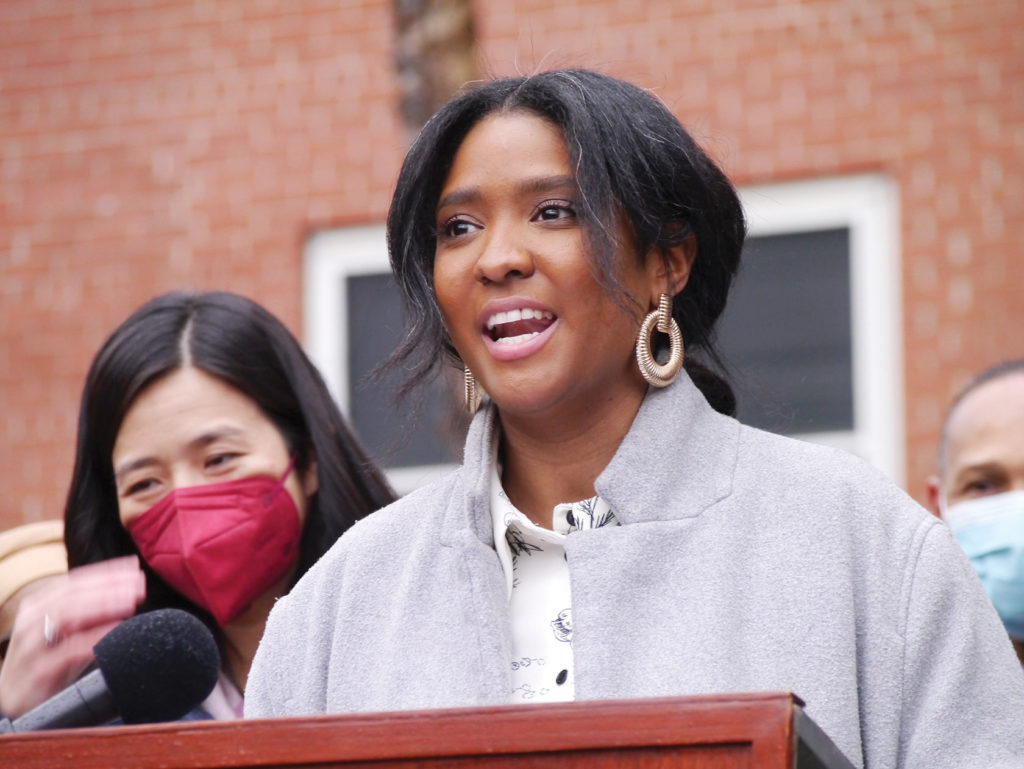
City Councilor Kendra Lara found herself mired in charges of antisemitism in June after a social media post critical of a federal appeals court decision that upheld an Arkansas law that bars state contractors from participating in boycotts of Israel.
Lara quickly apologized for her message addressed to the 8th Circuit appeals court justices, posted on Twitter: “y’all are letting the Zionists SHAKE YOU DOWN.”
Lara’s critics say the message, which implied that Zionists — people who support an ethno-religious state for Jews in historic Palestine — exerted pressure on the justices, was antisemitic, tapping into longstanding myths about Jews exerting undue control over government.
“The concept that Jews occupy leadership roles in government or control the government and banks was codified in the early 20th century,” noted Peggy Shuker, deputy director of the Anti-Defamation League’s New England office. “She can have an opinion on that court decision. Our concern was with the words she chose. She could have expressed it in a different way.”
Lara, who was born in the Dominican Republic, issued a public apology for the tweet.
“I understand now that the phrase I used contributes to a culture of increased white supremacist and anti-Semitic violence,” she wrote. “These anti-Semitic tropes are insidious, and I’m committed to weeding them out in myself and my community.”
Lara’s controversy came barely a week after an organization opposed to Israel’s military occupation of Palestinian territory, the Mapping Project, launched a website aimed at illustrating the ways local organizations including colleges, defense contractors and philanthropies support Israel’s expropriation and occupation of Palestinian land.
The website cast a wide net, including in one case a Jewish school that organizes trips to Israel, sparking controversy and charges of antisemitism.
Rising antisemitism
The dual controversies come at a time when instances of antisemitism are on the rise nationally, including a 2018 shooting at the Tree of Life Synagogue in Pittsburgh, that left 11 dead and a January 21 incident in Texas in which a rabbi and three congregants were taken hostage.
The ADL tabulated 2,717 antisemitic incidents in 2021, a 34% increase over the preceding year. In the context of rising hate crimes against Jews and people of color across the nation, Shuker says the Mapping Project caused anxiety in local communities.
“It was presented in a context that strikes fear among many Jewish people,” she said.
The people who worked on the Mapping Project did so anonymously and declined a request via email for an interview.
Bill Fletcher Jr., a senior scholar with the Institute for Policy Studies and past president of the TransAfrica Forum, said antisemitism is baked into American culture. During the presidency of Donald Trump, racism and antisemitism became more pronounced with prominent Republicans including Trump deploying antisemitic conspiracy theories and tropes. The great replacement theory, which posits that Jews are conspiring to replace whites in America with Blacks and immigrants entered the national consciousness during the 2017 white nationalist rally in Charlottesville, Virginia when tikki torch-bearing racists chanted “Jews will not replace us.”
But Fletcher says charges of antisemitism are too often used to target people who are anti-Zionist. When people level such allegations, it doesn’t help combat actual instances of antisemitism.
“It blurs the issue and makes it harder for people to understand what antisemitism really is,” he said. “Real antisemitism needs to be distinguished from false allegations of antisemitism.”
Jill Charney, an organizer with the Boston Chapter of the anti-occupation group Jewish Voice for Peace, said Lara faced that same dynamic.
“We understand that claims of antisemitism made by institutions like the [the Jewish Community Relations Council] and the ADL are often covers for promoting a pro-Israel agenda,” she said in a statement sent to the Banner. “In the current moment especially, these Zionist organizations are trying to amplify their considerable power to silence critics of Israel and Zionism. The growing repression of our right to free speech in order to silence Palestine solidarity activists is very troubling.”
Shifting public opinion
The controversies surrounding Lara and the Mapping Project demonstrate the difficulties local anti-Zionist activists have faced in advocating for an end to Israel’s occupation and human rights violations against Palestinians. Zionism is a movement that began in the late 1800s to create a Jewish homeland in what was then Palestine, which in the decades before Israel was founded was a British protectorate inhabited by Jews, Muslims and Christians.
In recent years, activists have used cellphone recordings and social media posts to detail Israeli aggression against Palestinians who live as citizens inside of Israel as well as those living in the portion of Palestine under Israeli military occupation. News media around the world have covered instances of Israeli aggression, including Israel Defense Force snipers’ targeting of unarmed protestors in the Gaza border protests of 2018 and 2019 and the attack on mourners at the funeral of Shereen Abu Aqleh, the Palestinian-American journalist shot dead by an Israeli soldier on May 11.
A number of human rights groups including Amnesty International, Human Rights Watch and the United Nations Office of the High Commissioner for Human Rights all within the last two years have declared Israel an apartheid state, a development that has done little to burnish the country’s image in the U.S.
“In the entire area between the Mediterranean Sea and the Jordan River, the Israeli regime implements laws, practices and state violence designed to cement the supremacy of one group — Jews — over another — Palestinians,” wrote the Israeli human rights group, B’Tselem, in a document explaining their support for the apartheid designation for Israel.
Lara agrees with this point of view.
“I think, fundamentally, the existence of an ethno-religious state leads to apartheid,” she said.
She’s not alone in her criticism of Israeli policy. Public opinion in the United States has shifted away from unconditional support for Israel, with increasing numbers of Americans opposing Israeli settlements in occupied Palestinian lands and a majority of Democrats, Republicans and independents opposed to laws penalizing people who boycott Israel.
In Congress, a small but vocal group of progressive lawmakers including U.S. Rep. Ayanna Pressley, New York Democrat Alexandra Ocasio Cortez and Michigan Democrat Rashida Tlaib have pushed back against the $3.8 billion in military aid the U.S. provides to Israel, seeking to link it to compliance with human rights norms.
Israel’s supporters in the U.S. have responded vigorously to the rising tide of opposition to Israel’s policies. The American Israeli Political Action Committee (AIPAC) spun off two so-called super PACs — political action committees that have this year pumped millions of dollars into Democratic and Republican primaries, in some cases running challengers against incumbents.
“They’re desperate because they’re seeing a shift in public opinion, especially among Jewish people,” Fletcher said of AIPAC.
Tlaib, the sole Palestinian-American in Congress, is facing a challenger backed by a super PAC with more than $1 million funded by billionaire AIPAC supporter Daniel Loeb.
Anti-BDS laws
As of last year, 35 states had passed laws penalizing state contractors who support the Boycott, Divestment and Sanctions (BDS) movement, an international push to pressure companies to stop doing business with Israeli firms that operate in the land the country has under military occupation. A similar push to enact anti-BDS legislation failed last year in Massachusetts.
In the Eighth Circuit Court of Appeals decision Lara referred to in her tweet, justices ruled that supporting the BDS movement is not protected under the First Amendment, a ruling that has roiled Palestinian rights activists.
“I think this is a very un-American ruling and position. This will flip the First Amendment on its head,” Abed Ayoub, legal director of the American-Arab Anti-Discrimination Committee, told Al Jazeera. “It’s shocking to see we’re living in a time where our courts are deteriorating our rights and abilities to express ourselves.”
Lara says her intention was not to promote antisemitic ideas. In the current political context of anti-BDS legislation — including a proposal voted down by the Massachusetts legislature last year — her comments sparked a rapid response from Jewish civil rights organizations. But she says she remains committed to Palestinian rights.
“There are places were antisemitism and anti-Zionism overlap,” she said. “I think there were people who were mad about what I said — rightfully so — and then there were people who were mad because I am an anti-Zionist.”






